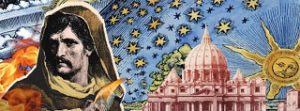
Bruno, besides the heretic
I read in my youth Giordano Bruno’s “La cena de las cenizas”, one of six dialogues written in Italian, written during his two-year stay in London (1583-1585).
written in Italian, written during his two-year stay in London (1583-1585).
The Dominican priest discussed the Copernican Revolution in this book, and although he was accused of heretic, his discussion was no other than Christian eschatology in his worldview beyond his time glimpsing the ways of the infinite world and his view of God.
He paid with his own life, being burned alive on February 17, 1600 in Rome, but all his commentators claim that their dialogue opened the way for a new link between the paths of cosmology and philosophy, but contrary to the medieval Christian worldview.
His philosophy went beyond the limitations of reason (mathematical and logical) using for his bold vision an amalgamation of basic facts and cosmic reality, but without neglecting a reflection that led to humanistic action.
Also fleeing empiricism and using mental experiments from which he deduced the ramifications of his worldview, some interpreters claim that he used reasoning similar to what Einstein used for his intuitions about the universe.
Referring to the cosmos as infinite reality, Bruno went beyond the spheres of Aristotle and Ptolemy, to him as well as to Kepler, Paracelsus and Nicolas de Cusa the universe is a living being that holds an essential unity that unites all particular beings, which are but emanations of the whole, this cosmological view influenced the entire Renaissance.
His worldview, which did not triumph in the Renaissance, perished and was interrupted by the emergence of Cartesian reason, Hume’s idealism and empiricism, but deserves to be reread and studied as a strong influence on Renaissance thought.
Here’s what was said about Giordano Bruno in the famous cosmos series:
https://www.youtube.com/watch?time_continue=6&v=XzTREw3AKEQ&feature=emb_logo









